10 Essential Pre-Holiday Car Checks You Can Do Yourself
Jessica Bird | Thursday 26th June 2025 3:07pm

Short breaks in the UK are a popular and cost-effective option when it comes to booking a holiday. In fact, in 2020, a Kwik Fit survey revealed that 13.1 million Brits used their vehicle for a summer staycation in the UK.
Yet many motorists admit they do not make basic car safety checks before embarking on a long journey. In fact, only 54% of the drivers we asked will check their tyre pressures before setting off, while only 49% will check their oil levels, 39% will check their tyre tread depth, and 23% will check the condition of their spare wheel before using their car to travel across the UK.
Making sure your car is ready for the road should be at the top of your holiday preparation checklist, so here are 10 simple checks you can do yourself.
1. Check your coolant levels
Coolant (or Ďantifreezeí) protects your engine from extremely cold temperatures during the winter months, and its high boiling point also removes excess heat from the engine. This makes it essential for avoiding breakdowns on a hot day, especially when idling in motorway traffic.
To check your coolant level:
- Locate your radiator reservoir under the bonnet.
- Make sure the coolant level is between the min and max lines.
- If you need to top up, make sure you select the right coolant for your car and fill until the level is between the two lines.
If youíre not sure where your radiator reservoir is, check your vehicle handbook.
2. Pack your car jack and locking wheel nut key
Save yourself from being stranded in the event of a puncture by making sure youíve got the tools to change a tyre ó just in case.
Without the locking wheel nut key to hand, you wonít be able to remove the wheel (and neither will a recovery vehicle).
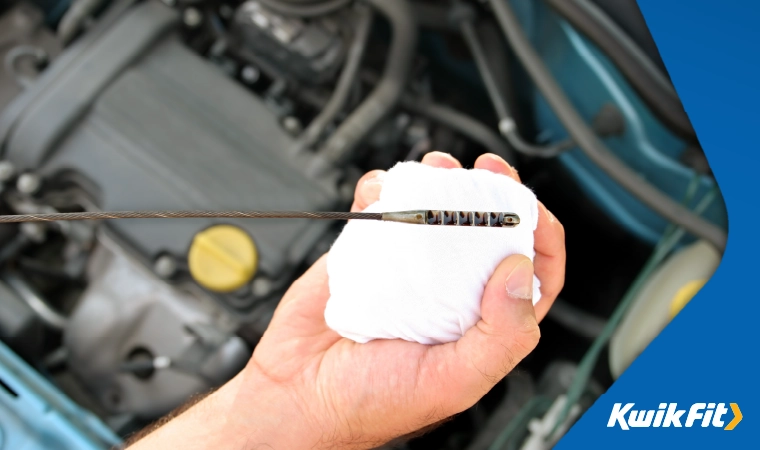
3. Check your dipstick for oil
If your oil levels are too low, your engine canít lubricate, cool, and clean its moving parts as required to keep your car running smoothly. If levels reach empty, your engine may seize up, causing you not only to break down, but to be faced with a hefty repair bill for replacement parts.
To check your engine oil:
- Locate your dipstick underneath the bonnet (identified by the ring pull (often yellow/orange in colour) coming out of the engine).
- Pull the dipstick out of the engine oil reservoir.
- Wipe the dipstick clean with a cloth, old rag, or tissue.
- Reinsert the dipstick and pull it back out.
- Check the oil level is between the two min and max markers at the end of the dipstick.
- Top up as needed with the type of oil recommended in your vehicle's handbook.
Has it been a while since your last oil check? Read our blog on how to tell if your car needs an oil change. You can always book in for an engine oil and filter change with Kwik Fit to ensure everything is tip-top.
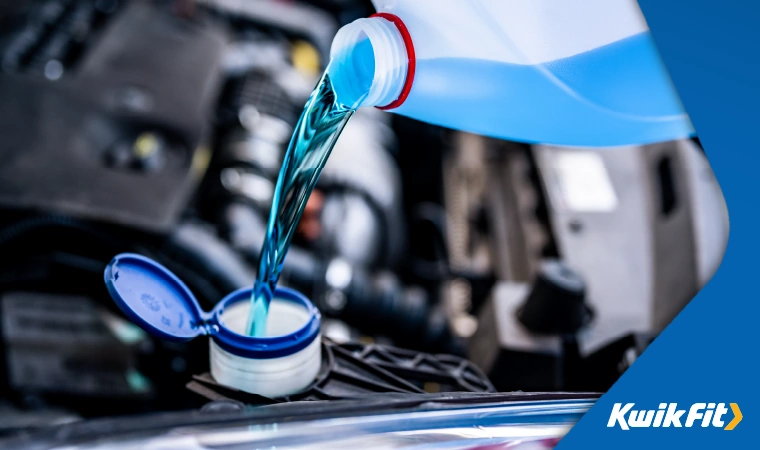
4. Refill your screenwash bottle
Dust and debris from other vehicles can dirty your windscreen and obscure your view, while low screenwash levels can cause streaks, worsening visibility further.
We recommend using a premixed screenwash, which is available at most service stations. Not only do they include cleaning agents that cut through grime, but the ingredients of screenwash also include coolant so that it does not freeze and expand in the pipes and washer bottle if left during winter.
To check your screenwash level:
- Locate the washer fluid reservoir under the bonnet (usually with a blue or yellow cap).
- Top up as needed.
- Make sure he screenwash fluid level is between the min and max lines.
For a more comprehensive rundown, head to our detailed step-by-step guide on topping up screenwash.
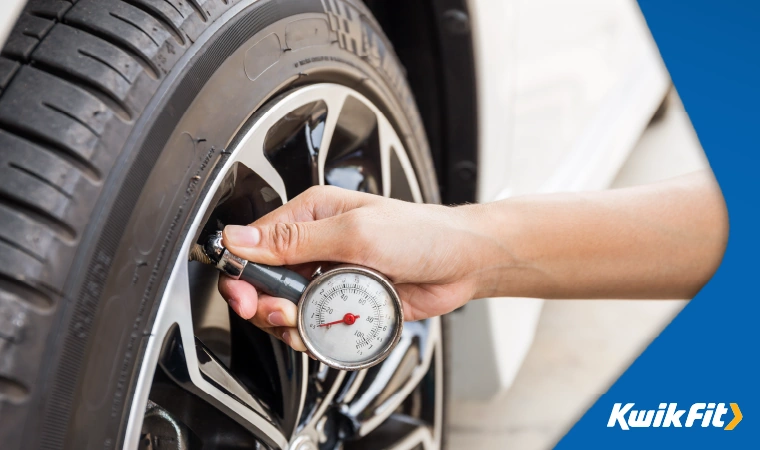
5. Check your tyre pressure on all tyres (including the spare)
While you should check your tyre pressure every month regardless, make a special effort to check your car tyres before leaving for your holiday.
Underinflated tyres are a major cause of tyre blowouts. If this occurs when travelling at high speeds, it could cause a fatal accident. Even tyres that are slightly below the correct tyre pressure can affect your braking distance, and reduce the life of your tyres by wearing unevenly.
Check your vehicle handbook for your recommended front and rear tyre pressure, or use our tyre pressure checker. Donít forget to check the spare too, as all tyres lose pressure gradually over time ó whether theyíve been used or not.
On a time crunch before you leave for your trip? Follow our simple ten-step guide to checking your tyre pressure.
6. Check your tyre tread for wear
While youíre checking your tyre pressures, make sure you also check the tread depth on all tyres to ensure they meet legal requirements.
While many think it's the brakes that help the car to stop, your tyres are the only part of the car that has contact with the road - so itís crucial to ensure they have suitable tread to grip and help you come to a prompt stop.
The legal limit in the UK is 1.6mm of tread across the central ĺ of the tyre, around the complete circumference of the tyre.
- You can use a tread depth indicator to measure how deep your tyre treads are.
- Or simply grab a 20 pence piece and stand it up in the tread groove as shown. If you can see the outer edge of the 20p, then itís time for a tyre replacement.
Tip: Consider self-sealing and run-flat options
You can prevent the likelihood of having to stop your journey due to tyre issues by fitting tyres with self-sealing and run-flat options. Self sealing tyres, such as those with Contiseal technology, will self-seal holes up to 5mm. This means that you can continue your journey until you reach a safe place to change your tyres.
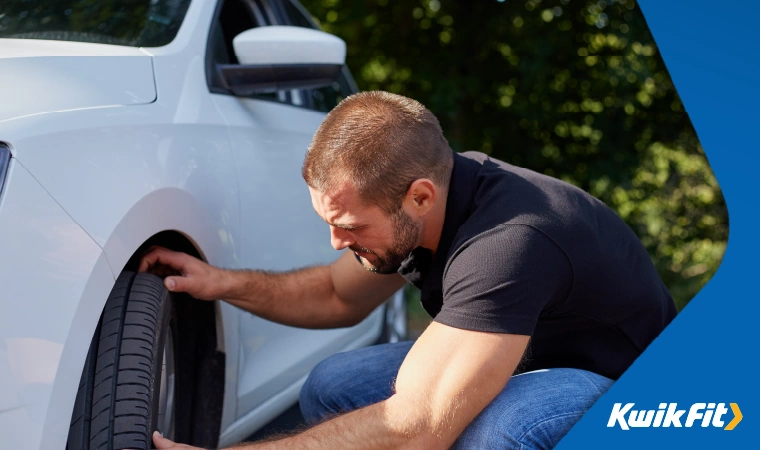
7. Check for tyre cracking and bulging
The overall condition of the tyres needs to be checked before hitting the road. If your tyres are old or have been exposed to a lot of sunlight, they can be prone to cracking. This is due to UV light oxidising the rubber in the tyres, causing them to lose their waxy properties, dry out, and crack. Meanwhile, potholes and curbs can also take their toll on tyres, and persistent impacts can cause the tyre sidewall to bulge and weaken.
- Visually inspect your tyres for any anomalies, such as cracking and bulging in both the tread area and sidewall.
If you are at all unsure about the condition of your tyres, contact your local Kwik Fit centre for tyre care advice.
8. Make sure all your lights are working properly
Before you drive off on your holiday, you should test all of your carís lights to ensure that theyíre in working order. This includes:
- Car headlights
- Brake lights
- Reverse light
- Indicators
- And internal cabin lights (you never know when you may need to stop to read the map!)
If you are having any issues, pop down to your local Kwik Fit where we can fit new replacement bulbs to save you the trouble.
Check those dashlights too...
If there are any warning lights on your dashboard, you should check them out before your journey, too. Issues such as tyres being inflated to the incorrect pressure can cause warning lights to appear. It is important to familiarise yourself with what these lights mean and how to resolve potential issues.
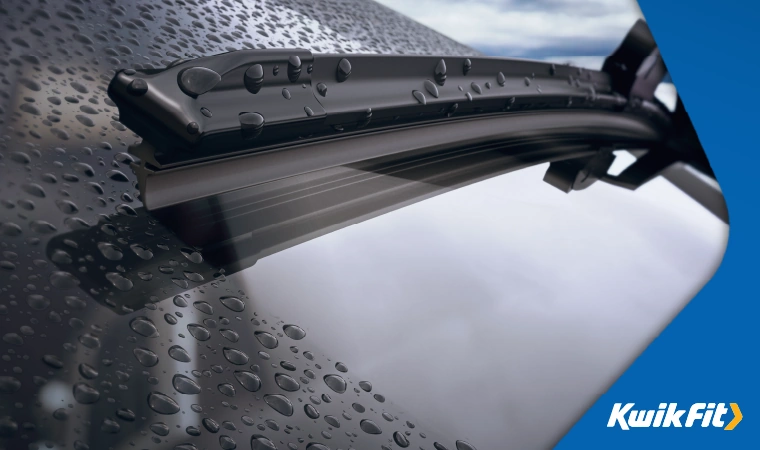
9. Turn on windscreen wipers and check wiper blades
You canít trust the weather, especially when holidaying in the UK. So, a good set of windscreen wipers are a must to ensure you can see the road clearly. Wipers are probably the least hardy part of your car, and will inevitably become damaged over time, needing replacement.
- Test whether the wiper blades ó front and back ó move when you turn them on.
- Check the blades for any splits in the rubber edge, which could prevent the wiper from clearing water or leave streaks in the line of view.
It can be tempting to neglect your wipers because youíre expecting good weather, but wipers are essential even on a hot day to clear grime and bugs from the windscreen.
10. Test your air con
While itís not crucial, travelling without a functioning car air con system can make summer journeys unpleasant. If you havenít used your car air conditioning since last summer, testing it before you go is a good idea, as itís not unusual for the air con system to develop a fault.
As air con gas permeates through the system over time, you may simply need an air con recharge, which is available at most Kwik Fit centres.
Keep your car holiday-ready with Kwik Fit
If you want to make sure that your car is ready for your holiday, book in for a Kwik Fit service. After a service, our trained technicians can advise on any maintenance required, either now or in the near future ó so that you set off on your summer holiday with complete peace of mind.
For any other advice you might need on pre-holiday car maintenance, get in touch with our team or check out our handy guides and detailed blogs.
Any facts, figures and prices shown in our blog articles are correct at time of publication.
Featured Articles
Is it Illegal to Drive With One Headlight?
Saturday 19th July 2025
Wondering if itís illegal to drive with one headlight? Learn about the safety risks and penalties of illegal blown bulbs and why you should fix them promptly.
Air Con in EVs & Hybrids: Experts Answer Your Questions
Monday 30th June 2025
Does air con drain EV batteries? Can you use the air con while charging an electric car? Find out the answers to these questions & more from Kwik Fitís experts.
Why Is Your Car Making a Noise? Fixes & Tips
Friday 13th June 2025
When your car starts making unexpected noises, it can certainly be quite disconcerting; it may be nothing to worry about, but hereís what you need to know.









